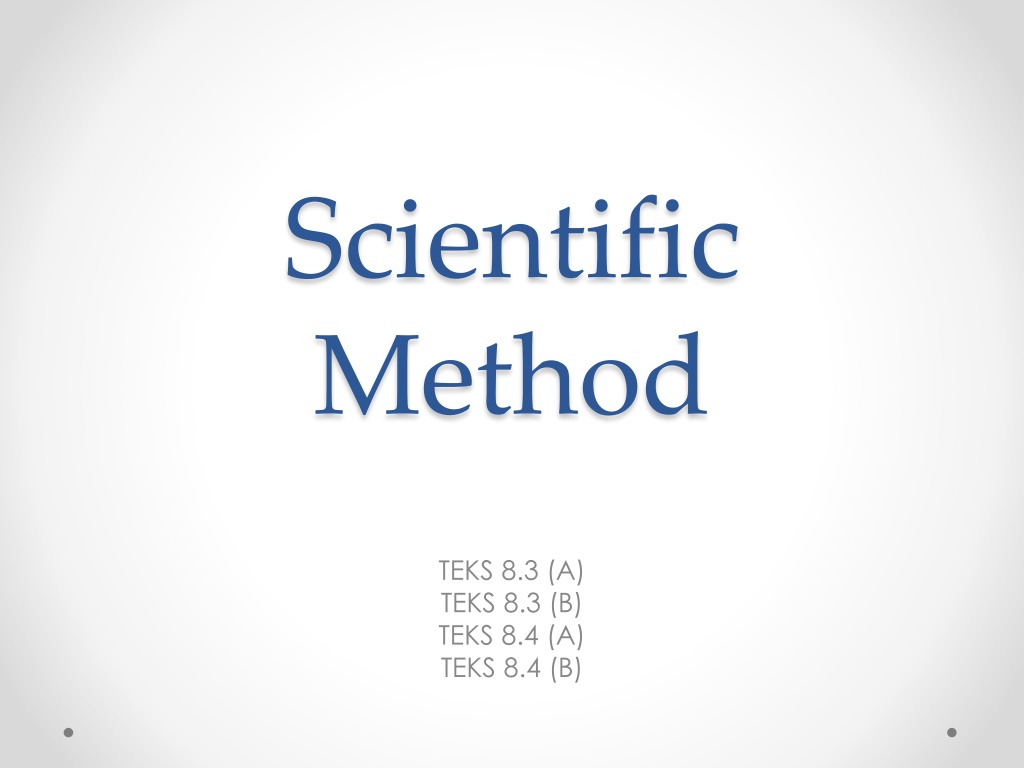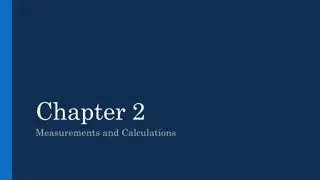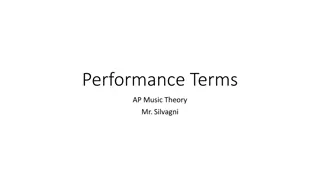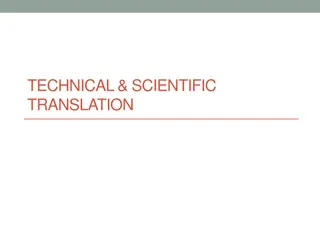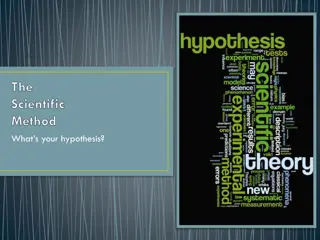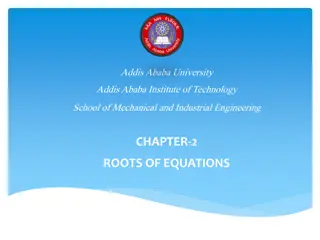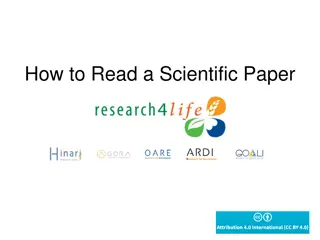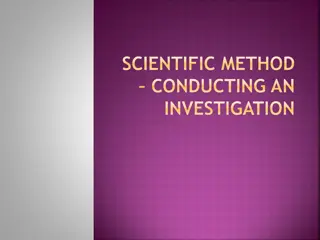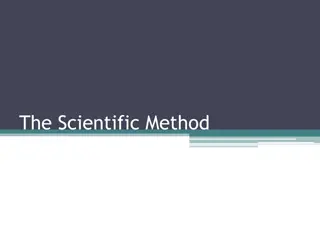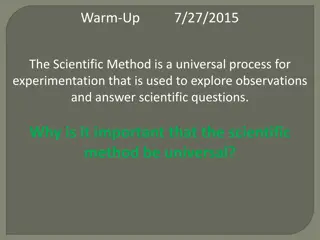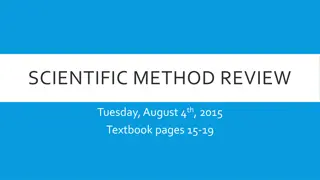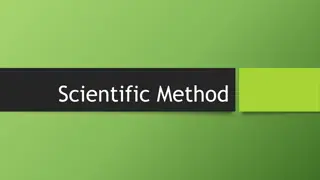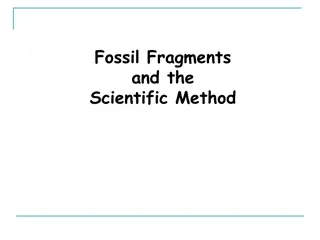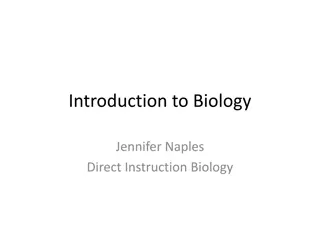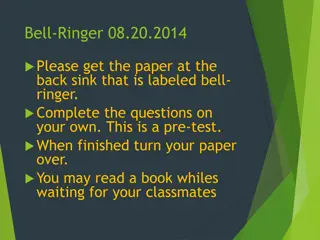Scientific Method: Key Concepts and Terms
Explore the Scientific Method, including key terms like hypothesis, theory, and law. Learn about fair tests, variables, and controls in experiments. Understand the concepts of dependent and independent variables through practical examples. Discover how scientists use this method to establish cause-and-effect relationships.
Download Presentation

Please find below an Image/Link to download the presentation.
The content on the website is provided AS IS for your information and personal use only. It may not be sold, licensed, or shared on other websites without obtaining consent from the author. Download presentation by click this link. If you encounter any issues during the download, it is possible that the publisher has removed the file from their server.
E N D
Presentation Transcript
Scientific Method TEKS 8.3 (A) TEKS 8.3 (B) TEKS 8.4 (A) TEKS 8.4 (B)
What is the Scientific Method? It is a series of steps that scientists use to search for cause and effect relationships. It is a way for an experiment to be designed so that only one item is changed to cause something else to happen in a predictable way
Key terms Before we get started
Hypothesis Typically formed using IF THEN .. statements An educated guess about what causes something to happen Uses few observations Is an idea based on observations without experimental evidence o What you believe will happen o What you are testing to find out Hmm! I think that if I change X then Y will occur!
Theory Uses many observations based on experimental evidence Can be applied to unrelated data and new ideas Is flexible and can be modified if new information is collected Common examples: General Relativity Big Bang Theory
Law Has been experimentally proven over and over o Has stood the test of time with little to no change Can create predictions for different circumstances Has uniformity and is universal These laws are NOT the same as laws made in court. They are much harder to break than laws made in court (speeding!).
Fair Test, Variables, and Controls To conduct a fair test in an experiment, you must only change one factor at a time while all other factors are kept the same Changing factors in experiments are called variables Factors that are kept the same in an experiment are called controlled variables What can be a variable?
Dependent vs. Independent Independent variables are the ones that are selected to be changed in an experiment o A valid experiment only has one independent variable to ensure that it is a fair test (too many independent variables lead to inconclusive results) Dependent variables are the factors that respond to the independent variable o Their response depends on the independent variable o Consider it to be what is being observed through testing and measuring THINK ON IT: A researcher wanted to see if music had an effect on heart rate. Identify the dependent and independent variables and the controlled variable. Answer: Independent variable: Music Dependent variable: Heart rate
A researcher wanted to see if music had an effect on heart rate Independent variable o What are we changing? presence of music Dependent variable o What are we observing? heart rate Controlled variable o What can we refer to see if there was a change? heart rate before music was played
Now the researcher wants to see if type of music has an effect on heart rate Independent variable o Genre of music (classical, pop, hip-hop, country) Dependent variable o Heart rate Controlled variable o Heart rate with no music playing o Can you think of other variables that need to be controlled in this experiment? Person undergoing test must be the same Ensure that heart rate is resting rate (person was not running or doing activities before the test) Noise level of music Environment of test
Sample Size When doing an experiment using people, you want to have a large enough sample size to eliminate personal bias In the music genre and heart rate example, you would want to have a large sample of people to see the effects of music on a variety of people. o You could break it into even smaller groups : children, teenagers, adults, elderly or a group of people that prefer the music genre
1: Ask a Question How, what, when, who, why, where? For the method to work, the question has to be about something that can be measured o Quantifiable (can be counted weight, age, height, amounts)
2: Do Background Research Use the library or Internet tools to help find the best way to plan your experiment Be sure to do your research so you can avoid repeating past mistakes
3: Construct a Hypothesis Must be stated in a way that can be easily measured, and must help you answer your original question If [this happens], then [this will occur]. Hmm! I think that if I change X, then Y will occur!
4: Experiment By doing an experiment, you are testing whether your hypothesis is true or false Should be able to be repeated Must be a fair test o Only one variable is changed, while all other variables are constant A good experiment should have o An independent variable o A dependent variable o Other variables that are held constant o A control
5: Analyze Review the data you have collected and compare it to your hypothesis o Does it support or not support your hypothesis? Regardless of the outcome, you should repeat your experiment to make sure you did not get a false positive, or if you need to tweak your original hypothesis to test in a different way.
6: Report Results Create a final report or display board to show how you came to your conclusions
In Summary Publish Purpose/Question Research Analysis/Conclusions What happened? Analyze data Hypothesis "I think..." Experiment!
